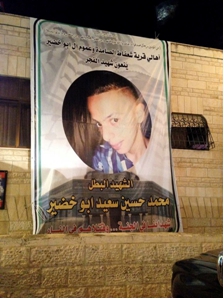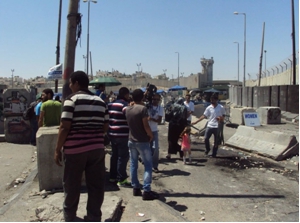The decision by several American colleges and universities to cancel and evacuate their student programs from Israel and Palestine in response to the recent conflict in Gaza and associated tension in the West Bank, as reported by the Associated Press http://www.timesofisrael.com/some-us-colleges-calling-students-back-from-israel/, has indeed raised many questions of whether the safety risks for international students were severe enough to warrant such evacuations. This author was among the many students evacuated on short notice at the direction of my university’s administration upon the launch of the Israel Defense Forces’ “Operation Protective Edge” in early July.
In less than 24 hours, I went from planning a weekend visit to Bethlehem, to planning an immediate departure from Israel on a nearly sold-out flight involving a 5 AM taxi ride from Jerusalem to Tel Aviv, which also included my first trip to a bomb shelter while rocket sirens warned of incoming Hamas missiles. After having enjoyed a fascinating month of exploring Israel and Palestine, from Tel Aviv and Haifa to Ramallah and Birzeit, the sudden evacuation directive was an abrupt and surreal conclusion to my experience as a student living and working in the environment of the Israeli-Palestinian conflict. While such evacuation decisions made by several school administrations were naturally disappointing to myself and my fellow students, I ultimately cannot criticize the discretion of administrators to err on the side of safety when supervising their students abroad. Although hardly the conclusion I had expected, predicted, or desired when I had signed on for an engaging summer program studying regional conflict resolution efforts, in a way the evacuation was a fitting culmination to the experience and offered some unique lessons on the phenomenon of the conflict.

Bomb Shelter in Ben Gurion Airport where several U.S. students, including this author, took cover during rocket attacks. Image by George Mason University Israel-Palestine Summer Program Students.
Erring on the Side of Safety
Writing now with the benefit of hindsight, I credit my university administration for recognizing early on that the violence was escalating quickly and that this most recent conflict would potentially be protracted for the remainder of the summer. I especially was more deferential to the administration’s decision following the American Federal Aviation Authority’s temporary suspension in late July of all U.S. airline flights to and from Israel due to Ben Gurion Airport’s proximity to the conflict zone in Gaza. With the Malaysia Airlines Flight 17 disaster in Ukraine in the headlines and the potential that no flight directly home to the United States would have been readily available if the flight suspension had been extended, I would have been more concerned as an international student if I had continued to stay in Israel under those conditions.
While whether the decision of the FAA and private airlines to suspend flights to Israel was a prudent precaution or a misguided overreaction to the Gaza conflict is a separate topic of debate, in either case such a decision was beyond the control of school administrations who had to make their own decisions under uncertain circumstances. In an alternate history, there is always the hypothetical possibility that the recent conflict may not have escalated and the concerns that prompted the evacuation decision may not have materialized. Although as the actual events of this summer played out, with the worst violence remaining more-or-less localized to certain flashpoints and the security of the civilian population in Israel not being seriously compromised thanks to the effectiveness of the Iron Dome defense system, there also is the hypothetical possibility that the conflict could have escalated to much more severe levels.
That being said, I trust that most of my fellow international fellow students realized that, in choosing to study abroad in Israel and Palestine, we were accepting the risks of living in a country where the threat of conflict is a daily reality. In the particular program that I was participating in, which as previously mentioned was a conflict resolution studies program exploring the nature of the Israeli-Palestinian conflict, gaining firsthand exposure and understanding of the realities of life in the context of this conflict was the purpose of our time in the country. However there is a point - not always easy to identify - where exposure to conflict crosses the line into unacceptable endangerment from that conflict, and my university’s administration reserved the prerogative of judging for us when this line had been crossed.


Unrest in East Jerusalem, not far from where several U.S. students were residing during their summer program Images by George Mason University Israel-Palestine Summer Program Students
Learning through the Evacuation Experience
Although disappointed with the evacuation decision, I must also admit that my sense of personal safety had declined in the immediate days preceding the evacuation announcement. While I did not feel particularly unsafe for the vast majority of my month-long stay in Israel, during which I had comfortably lived in the Old City of Jerusalem, worked as an intern in East Jerusalem, and made multiple trips to the West Bank, the tension in my environment was palpably increasing in the circumstances leading up to the cancellation of my program. Especially in the aftermath of the kidnapping and murder of three Israeli teenagers and the retaliatory murder of a Palestinian teenager in mid-June and early July, widespread unrest and hostility quickly became visible on both sides of the Israeli-Palestinian divide.
In my temporary hometown of Jerusalem, rioting and aggressive demonstrations were becoming increasingly commonplace. While traveling back and forth from Ramallah to Tel Aviv on the weekend of July 4th, my fellow students and I had some unsettling encounters attempting to cross the checkpoints between Israel and the West Bank. On the same evening that the cancellation announcement was made, I heard rocket sirens for the first time in my life in West Jerusalem and was advised to seek shelter in a stone basement. While waiting to board my flight back to the United States, my fellow students and I again had to make use of the Ben Gurion Airport bomb shelter. My experiences on July 4th were particularly surreal, where my day started in the West Bank with the smell of tear gas and the sound of shouting security guards at the Qalandia checkpoint, yet ended in Tel Aviv with the smell of the seashore and the sound of fans yelling in excitement watching the World Cup along the beach. As we enjoyed the waterfront sunset marking the start of Shabbat in Tel Aviv, that same Friday evening severe riots were occurring in Jerusalem not far from where I lived and worked through the week. And little did I expect that by the following Friday I would find myself back in the United States. Even if through all this I did not seriously fear that I was in immediate danger, the fundamental reality that this is a country in conflict was all the more apparent, as was the realization that the true “normalcy” of life will be elusive until an authentic peaceful resolution is reached.


From Qalandia checkpoint to the beaches of Tel Aviv, the disparity from morning to evening on July 4, 2014 Images by George Mason University Israel-Palestine Summer Program Students
The experience of my hurried and slightly harrowing departure from Israel was another small revelation of the inherent volatility of living in such a reality of conflict, where sudden unpredictable events and intense conditions can change the course of life so quickly. While my unexpected shock was merely an email directing me to pack my things and catch the next available flight home, for too many others who call this country their home, their unexpected shock can come in the form of a notice telling them their land or their house is being confiscated, or a soldier at the door arresting a family member, or a child being abducted off the street, or a rocket exploding over your head.
Furthermore, as an international student only visiting this country, I have the “luxury” of being able to simply fly back to my safe homeland and leave behind this conflict, while for so many others this is their home that they are attached to. As I stood in the stairwell of a bomb shelter in the final hours before my flight back to America, I was struck by the thought that while this was a novel experience for me that I did not expect to repeat in the future, for most of the local people around me this was not the first nor the last time they would find themselves seeking such shelter from indiscriminate violence. This was the daily reality for them, a daily reality that they could not comfortably fly away from as I was. In coming to these realizations, I have come to find the value of my experience in this conclusion to my time in Israel and Palestine.
